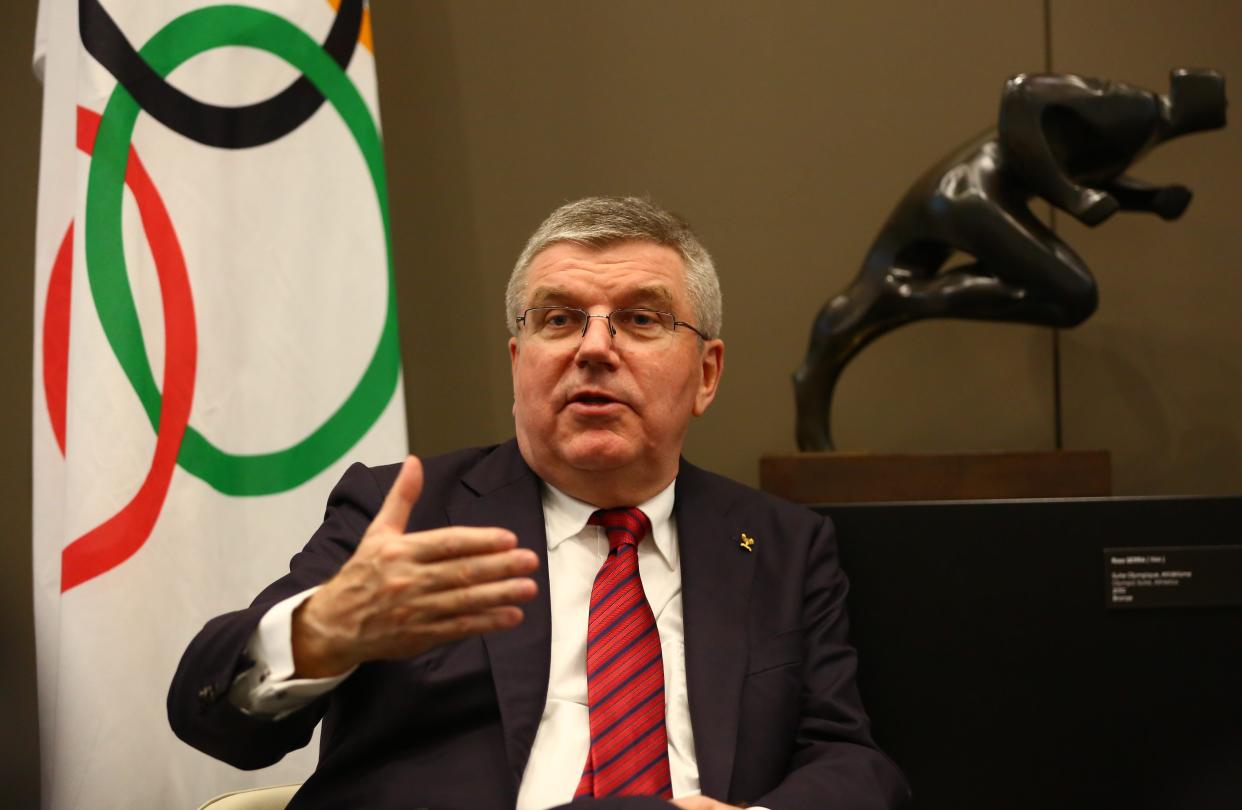The IOC claims it's helping Peng Shuai. But there's one thing it blatantly ignores

To the International Olympic Committee, Peng Shuai's allegation that a high-ranking Chinese politician coerced her into sex has been "the issue," and "a personal question," and "this very difficult moment of her life."
It's "this case," and "any problem that she might have," and "her situation."
On Wednesday, at IOC president Thomas Bach's first news conference since Peng's allegation, it was the "fragile situation Peng Shuai is in."
It has never, explicitly, been a sexual assault allegation. Bach and other IOC officials continued this week to avoid those words. On Thursday, when pressed on why the IOC even felt the need to offer Peng support, Bach finally mentioned "the allegations she made," but kept his reasoning vague, mentioning the "effect this has in the world," and on Peng "as a human."
Rights groups and athlete advocates have criticized this evasiveness. Global Athlete said in a statement last month that the IOC "demonstrate[d] an abhorrent indifference to sexual violence and the well-being of female athletes." Sophie Richardson, China director at Human Rights Watch, said the IOC's approach sent a disturbing, unsupportive message "not just to Peng Shuai, but to other women across China struggling to get credible allegations of sexual assault or sexual harassment or sexual violence heard and investigated and prosecuted."
IOC's wording aligns with Chinese propaganda
Experts have noted that the IOC's careful wording falls in line with China's erasure. Internally, in the hours, days and weeks after Peng, 35, said in a Nov. 2 social media post that Zhang Gaoli, a former Communist Party vice premier, had coerced her into sex, Chinese authorities scrubbed her allegations from the internet, and blocked widespread international concern from even entering China's highly-censored cyberspace. Externally, state media sought to address that concern with dubious evidence and assurances that Peng was fine. One prominent Communist Party-affiliated editor referred to her allegations on Twitter — which is banned in China — as "the thing people talked about.”
On Tuesday and Wednesday, Bach and his colleagues spoke carefully about the subject at virtual news conferences, and did not break from the party line. They did not given any indication that they discussed Peng's sexual assault allegations with her on two video calls. In a recent interview with German outlet DPA, Bach instead mentioned that Peng, during the first call, had "talked about her career as a tennis player and her three Olympic appearances, and [the] effects the COVID pandemic is having on the continuation of her career."
On Thursday, when asked at a second news conference whether sexual assault had been discussed, Bach responded by saying: "I can assure you that all aspects of this case are being discussed with the Chinese side."
The IOC has championed its "quiet diplomacy." Its two calls with Peng, on Nov. 21 and Dec. 1, represent her only verified communication with people outside China since she posted the allegations and subsequently disappeared from public view.
Experts, though, have criticized those calls as "highly orchestrated" and "staged," and accused the IOC of "actively" amplifying Chinese propaganda. The Chinese government, they pointed out, has a long history of silencing high-profile dissenters and “erasing inconvenient truths,” then forcing the oppressed to appear on video to recant allegations, admit to crimes or tell the public that they are safe and well. In cases of international concern, the government often turns to foreign people and organizations to lend legitimacy.
When presented with the accusation that the IOC had sided with the Chinese government in Peng's case, Bach said Wednesday: "It's a clear no."
IOC can't 'give assurances' that Peng is free
Experts suspected the Chinese government had been involved in arranging the IOC's calls with Peng. When asked Wednesday for more details, Bach said the IOC had initiated contact with "the sports organization in China." (Much of Chinese sport is affiliated with the government.) He said that the presence of a Chinese Olympic official on the first video call, which many cited to support suspicions that Peng was not free from surveillance and coercion, was "to be able to give us, in case of need, some cultural background." When asked whether he'd consider adding a more independent participant to future calls with Peng, he said that the chair of the IOC Athletes' Commission, who joined the first call, was "as independent as somebody from another community." (This is not true.)
Bach also seemed to indicate that he himself was not part of the "IOC team" on the second call with Peng, but did not offer further details.
"All of us," he said "are having the same impression, that we could not feel her being under pressure. And for the rest, we can only report what she reported in the call."
IOC spokesman Mark Adams, however, acknowledged on Tuesday that the IOC could not "give assurances," does not "know the full facts" of the case, and does not know why others outside of China have not been able to reach Peng. Steve Simon, the head of the Women's Tennis Association, has made multiple efforts to contact her, but according to a WTA spokeswoman, "it was clear her responses were influenced by others." Simon, the spokeswoman said last week, remained "deeply concerned that Peng is not free from censorship or coercion and decided not to re-engage via email until he was satisfied her responses were her own, and not those of her censors."
Bach, on Wednesday, did not directly address suspicions of coercion, and did not address the Chinese government's sophisticated attempts to silence Peng. "Suspicions, you can have always and about everything," he said somewhat dismissively.
He argued that the IOC has "achieved so far with these talks what we could be reasonably be expected to achieve," and said that it will continue to support Peng moving forward.
